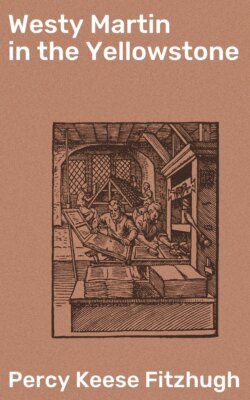Читать книгу Westy Martin in the Yellowstone - Percy Keese Fitzhugh - Страница 6
На сайте Литреса книга снята с продажи.
CHAPTER IV
THE CHANCE COMES
ОглавлениеTable of Contents
Then it was that Westy Martin, thoroughly disgusted with fate and thoroughly dissatisfied with himself and boy scouting generally, arose, just as the trainman called out: “Emigrant! Emigrant is the next stop!” And Westy Martin, leading the way, went headlong into the adventurous field of “big scouting”—never knowing it.
The three of them sat down disconsolately on one of the steps of the rear platform of the last car while the train paused at Emigrant, a deserted hamlet almost small enough to put in one’s pocket. Warde and Ed had followed Westy through the several cars, not fully sharing his mood, but obedient to him as leader. They made a doleful little trio, these fine boys who had been given a trip to the Yellowstone Park by the Rotary Club of America in recognition of a heroic good turn which each had done. Alas, that this glib stranger, Mr. Wilde, and that other unknown hero, Shining Sun, the Indian boy, should have destroyed, as it were with one fell blow, their wholesome enjoyment of scouting and their happy anticipations. Poor Westy.
I must relate for you the conversation of these three as they sat in disgruntled retirement on the rear platform of the last car nursing their envy of Shining Sun.
“I remind myself of Pee-wee Harris tracking a hop-toad,” grouched Westy.
“Just the same we’ve had a lot of fun since we’ve been in the scouts,” said Warde. “If we hadn’t been scouts we wouldn’t be here.”
“We’ll be looking at geysers and hot springs and things while they’re tracking grizzlies,” said Westy. “We’re boy scouts all right! Gee whiz, I’d like to do something big.”
“Just because Mr. Wilde says this and that——” Ed Carlyle began.
“Suppose he had gone to Scout headquarters in New York for a scout to help him in the mountains,” said Westy. “Would he have found one? When it comes to dead serious business——”
“Look what Roosevelt said about Boy Scouts,” cheered Warde. “He said they were a lot of help and that scouting is a peach of a thing, that’s just what he said.”
“Why didn’t you tell Mr. Wilde that?” Ed asked.
“Because I didn’t think of it,” said Warde.
“Just because I got the tracking badge that doesn’t mean I’m a professional scout like Buffalo Bill,” said Ed. “We’ve had plenty of fun and we’re going to see the sights out in Yellowstone.”
“While they’re scouting—doing something big,” grouched Westy.
“We should worry about them,” said Ed.
Westy only looked straight ahead of him, his abstracted gaze fixed upon the wild, lonesome mountains. A great bird was soaring above them, and he watched it till it became a mere speck. And meanwhile the locomotive steamed at steady intervals like an impatient beast. Then, suddenly, its voice changed, there were strain and effort in its steaming.
“Guess we’re going to go,” said Warde, winking at Ed in silent comment on Westy’s mood. “Now for the little old Yellowstone, hey, Westy, old scout?”
“Scout!” sneered Westy.
“Wake up, come out of that, you old grouch,” laughed Ed. “Don’t you know a scout is supposed to smile and look pleasant? Who cares about Stove Polish, or Shining Sun, or whatever his name is? I should bother my young life about Mr. Madison C. Wilde.”
“If we never did anything real and big it’s because there weren’t any of those things for us to do,” said Warde.
Westy did not answer, only arose in a rather disgruntled way and stepped off the platform. He strolled forward, as perhaps you who have followed his adventures will remember, till he reached the other end of the car. He was kicking a stone as he went. When he raised his eyes from the stone he saw that the car stood quite alone; it was on a siding, as he noticed now. The train, bearing that loquacious stranger, Mr. Madison C. Wilde, was rushing away among the mountains.
So, after all, Westy Martin had his wish (if that were really desirable) and was certainly face to face with something real and big and with a predicament rather chilling. He and his two companions, all three of them just nice boy scouts, were quite alone in the Rocky Mountains.
